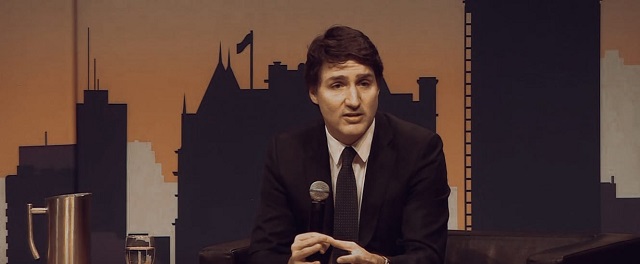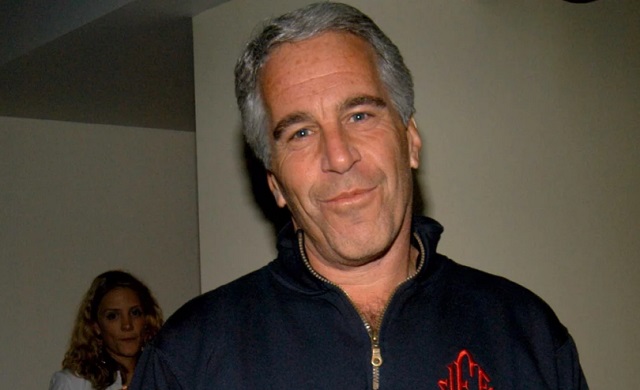Opinion
Trudeau’s Winnipeg Whitewash – A Masterclass in Diversion and Disconnection

From The Opposition with Dan Knight
As Canada grapples with soaring housing costs and a quality of life crisis, the Prime Minister’s narrative on immigration & multicultural success stories clashes with the lived realities of Canadians
As some of you enjoyed the comfort of Family Day, perhaps some of you noticed Justin Trudeau making the rounds in Winnipeg – (Justin Trudeau Fireside Chat at Winnipeg Chamber of Commerce – February 16, 2024), where he found quite the fan in Loren Remillard of the Winnipeg Chamber of Commerce. It seems Remillard was all too eager to extend a metaphorical hand, fishing for tax dollars to prop up their projects.
Oh, let’s dissect the masterful art of political deflection and diversion, shall we? Justin Trudeau, spun a narrative so disconnected from the reality Canadians live in, it’s almost an art form. He lauds Toronto and Vancouver as paragons of multicultural success, cities thriving under the weight of their diversity. But here’s the catch folks—the reality on the ground, as reported by Stats Canada, tells a story that’s anything but rosy for the residents of these supposed utopias.
When we turn our gaze to the real impact of his government’s immigration policies on the ground, the picture is starkly different. Toronto and Vancouver, the benchmarks of Trudeau’s immigration success story, are in fact cities where residents report a lower quality of life than their provincial counterparts. Why? Because amidst the fanfare of diversity and inclusion, the basic needs of the citizens—like feeling a sense of belonging, life satisfaction, and mental health—are being sidelined.
Let’s not forget the elephant in the room Trudeau casually mentioned—2 million temporary residents flooding into Canada. This isn’t just a number; it’s a tsunami of demand in addition to the Liberal 500k target per year of permanent resident hitting a housing market already gasping for air, driving rents and shelter costs to astronomical heights. And Trudeau’s response? A shrug of the shoulders and a diversion to talk about measures with Mexico or the plight of international students. While these issues merit attention, they dance around the core issue: a government more obsessed with its global image than the welfare of its citizens.
The audacity to claim that Toronto and Vancouver are thriving under his policies, while Stats Canada directly contradicts this with evidence of declining quality of life, is nothing short of political theater. It’s a sleight of hand designed to distract from the harsh reality—that his government’s approach to immigration and temporary residents is contributing to a crisis of affordability and well-being in our major cities.
But amidst the spectacle, Trudeau touched on a subject that should raise eyebrows across the nation: On how his government is using immigration as a tool to “grow the economy.” Now, let’s pause for a moment to digest that, shall we?
Diving deeper, a fascinating exchange caught my ear during a Finance Committee meeting FINA-124 -February 1, 2024, where Tiff Macklem of the Bank of Canada offered some candid insights. When prodded by Mr. Jasraj Singh Hallan, Macklem conceded that the government’s spending spree and the Bank’s efforts to stabilize our economy were essentially at loggerheads. Here we have the Trudeau administration, pushing fiscal policies that seem to sprint in the opposite direction of monetary sanity.
Macklem went on, outlining that yes, government spending is contributing to growth, but let’s be clear about the kind of growth we’re talking about here. It’s one that barely keeps pace with population increases, teetering on the edge of potential. And with government spending poised to climb even higher, we’re flirting dangerously close to exacerbating inflation, rather than reining it in.
Senior Deputy Governor Carolyn Rogers chimed in with a stark reminder of the housing market’s woes. Despite interest rate hikes, which traditionally cool down housing prices, Canada’s chronic housing shortage keeps prices stubbornly high. The result? A housing affordability crisis that’s squeezing Canadians tighter than ever, exacerbated by an immigration policy that is throwing fuel on the fire of demand without addressing the urgent need for supply.
This is the picture Trudeau’s policies paint for Canada: a nation where the cost of living climbs ever higher, where the dream of homeownership slips further away for the average citizen, and where economic growth strategies seem disconnected from the realities on the ground. It’s high time for a reality check, a moment to ask ourselves whether these policies truly serve the best interest of Canadians or merely the political agenda of those in power.
Indeed, the root of the issue is staring us right in the face—supply problems are driving costs through the roof. Yet, it seems as though there’s a conspiracy of silence in the House of Commons; no one dares to utter the truth that unchecked immigration is exacerbating these supply woes, sending shelter costs soaring. Let’s dive into the latest from Stats Canada to unravel the narrative everyone is thriving under Justin Trudeau.
First off, let’s talk about renters. According to this report, if you’re renting, your quality of life isn’t just on the lower rung; it’s plummeting. Renters are staggering under the weight of financial pressures unheard of for homeowners, feeling the pinch of record-low vacancy rates and rent hikes that would make your head spin. Over 15 percentage points more likely to struggle financially and over 11 points less likely to experience life satisfaction.
But the plot thickens when we look at the younger Canadians, those aged 15 to 54. They’re caught in a vise, with life satisfaction and mental health scores that trail behind their older counterparts. The dream of home ownership? A mirage for many, as they navigate a landscape where the very idea of paying off a mortgage seems like a relic of a bygone era. And let’s not even get started on the economic tightrope walked by residents of Toronto and Vancouver, cities where the cost of living soars as high as the skyscrapers dotting their skylines.
Now, Trudeau’s government might have you believe that policies are in place to bridge these divides, to bolster the quality of life for all Canadians. But let’s be real—the evidence suggests otherwise. With renters and younger generations buckling under financial strains and cities like Toronto and Vancouver becoming enclaves of the unaffordable, the narrative being spun by the current administration seems more fiction than fact.
Consider the financial strain laid bare by these statistics: a significant portion of Canadians are finding it increasingly difficult to meet their financial needs, with shelter costs consuming a lion’s share of their income.
In a landscape marked by disparities in quality of life we’re left with a pressing question: where does the path forward lie?
Let’s cut to the chase, folks. The latest 338 polling data isn’t just a blip on the political radar; it’s a resounding bell tolling for the end of the Liberals’ reign, inching closer to losing their official party status. Why, you might ask? It’s simple: Justin Trudeau’s legacy is one of profound ineptitude, a legacy that has systematically failed Canadians at every turn. When Trudeau touts his housing policies, claiming to increase rentals, remember the cold, hard facts from Stats Canada—he’s not building homes; he’s crafting a nation with a diminished quality of life. That’s the Trudeau vision for Canada.
And let’s not overlook the audacity of his actions—jetting off to Jamaica with a hefty $162,000 bill footed by you, the taxpayer. It seems Trudeau’s concern for your quality of life evaporates faster than a Liberal MP can devour lobster in Malaysia. Meanwhile, ordinary Canadians are left to scrounge at food banks. But hey, as long as the political elite get their fill, right?
SNC-Lavalin was just the beginning, the canary in the coal mine signaling the avalanche of corruption set to spill out from Trudeau’s government. WE Charity, the Trudeau Foundation, Chinese interference, ArriveScam… the list of scandals under Trudeau’s watch is as long as it is disgraceful. These aren’t mere footnotes in history; they’re the defining features of his tenure.
Remember the uproar over a $16 orange juice under Harper? That was considered the height of scandal, a benchmark of accountability. Fast forward to today, and this government can’t even spell ‘ethics,’ let alone practice it.
So, my fellow Canadians, as we look ahead to the next election, we’re presented with a golden opportunity—a chance to reset the narrative and send a clear message to the liberal elites that we’ve had enough of their disdain for the average citizen. I, for one, will be cheering on the red wedding of Canadian politics because the liberal standard is not just detrimental to your well-being; it’s an affront to all of Canada. It’s time to say enough is enough and reclaim the Canada we know and love—a Canada of integrity, accountability, and true north strong and free.
espionage
Trump: “I HAVE JUST SIGNED THE BILL TO RELEASE THE EPSTEIN FILES!”

President Trump moved Wednesday to end years of secrecy surrounding one of the nation’s most notorious scandals, signing legislation that compels the Department of Justice to hand Congress virtually every scrap of material tied to Jeffrey Epstein. The president announced the move on Truth Social, writing, “I HAVE JUST SIGNED THE BILL TO RELEASE THE EPSTEIN FILES!”
Trump reminded supporters that he personally pressed House Speaker Mike Johnson and Senate Majority Leader John Thune to fast-track the legislation. “Because of this request, the votes were almost unanimous in favor of passage,” he wrote, pointing to the rare level of bipartisan agreement behind a bill that forces unprecedented transparency. The Epstein Files Transparency Act requires the DOJ to deliver all unclassified records — and as much classified material as possible — to Congress within 30 days. It also directs Attorney General Pam Bondi to provide lawmakers with a list of government officials and other “politically exposed persons” tied to Epstein within just 15 days.
The measure sailed through the House in a staggering 427–1 vote Tuesday before clearing the Senate unanimously. Its path to passage wasn’t always straightforward. For months, the Trump administration had sparred with lawmakers pushing for the release, with the president often calling the frenzy around “Epstein files” a Democrat-driven hoax designed to smear him.
In his Truth Social post, Trump leaned into the history, reminding Americans that Epstein “was charged by the Trump Justice Department in 2019 (Not the Democrats!)” and that the disgraced financier “was a lifelong Democrat” who poured money into Democrat campaigns. The president also pointed to Epstein’s well-documented relationships with high-profile Democrats, listing figures such as Bill Clinton — “who traveled on his plane 26 times” — former Treasury Secretary Larry Summers, activist billionaire Reid Hoffman, House Minority Leader Hakeem Jeffries, and Delegate Stacey Plaskett. “Perhaps the truth about these Democrats, and their associations with Jeffrey Epstein, will soon be revealed,” Trump wrote.
He added that the DOJ, under his direction, has already provided Congress nearly 50,000 pages of Epstein-related material — a stark contrast, he said, to the Biden administration, which “did not turn over a SINGLE file or page related to Democrat Epstein, nor did they ever even speak about him.”
For Trump, the transparency push is as much about exposing what Democrats don’t want voters to see as it is about delivering documents. He argued that the left had leaned on “the ‘Epstein’ issue” to distract from the “AMAZING Victories” of his administration. Now, with the bill signed and agencies under a firm deadline, he predicted the political tables are about to turn.
“This latest Hoax will backfire on the Democrats just as all of the rest have!” he wrote — a warning, and a promise, as Washington braces for whatever the next 30 days will reveal.
Business
Canada is failing dismally at our climate goals. We’re also ruining our economy.

From the Fraser Institute
By Annika Segelhorst and Elmira Aliakbari
Short-term climate pledges simply chase deadlines, not results
The annual meeting of the United Nations Conference of the Parties, or COP, which is dedicated to implementing international action on climate change, is now underway in Brazil. Like other signatories to the Paris Agreement, Canada is required to provide a progress update on our pledge to reduce greenhouse gas (GHG) emissions by 40 to 45 per cent below 2005 levels by 2030. After decades of massive government spending and heavy-handed regulations aimed at decarbonizing our economy, we’re far from achieving that goal. It’s time for Canada to move past arbitrary short-term goals and deadlines, and instead focus on more effective ways to support climate objectives.
Since signing the Paris Agreement in 2015, the federal government has introduced dozens of measures intended to reduce Canada’s carbon emissions, including more than $150 billion in “green economy” spending, the national carbon tax, the arbitrary cap on emissions imposed exclusively on the oil and gas sector, stronger energy efficiency requirements for buildings and automobiles, electric vehicle mandates, and stricter methane regulations for the oil and gas industry.
Recent estimates show that achieving the federal government’s target will impose significant costs on Canadians, including 164,000 job losses and a reduction in economic output of 6.2 per cent by 2030 (compared to a scenario where we don’t have these measures in place). For Canadian workers, this means losing $6,700 (each, on average) annually by 2030.
Yet even with all these costly measures, Canada will only achieve 57 per cent of its goal for emissions reductions. Several studies have already confirmed that Canada, despite massive green spending and heavy-handed regulations to decarbonize the economy over the past decade, remains off track to meet its 2030 emission reduction target.
And even if Canada somehow met its costly and stringent emission reduction target, the impact on the Earth’s climate would be minimal. Canada accounts for less than 2 per cent of global emissions, and that share is projected to fall as developing countries consume increasing quantities of energy to support rising living standards. In 2025, according to the International Energy Agency (IEA), emerging and developing economies are driving 80 per cent of the growth in global energy demand. Further, IEA projects that fossil fuels will remain foundational to the global energy mix for decades, especially in developing economies. This means that even if Canada were to aggressively pursue short-term emission reductions and all the economic costs it would imposes on Canadians, the overall climate results would be negligible.
Rather than focusing on arbitrary deadline-contingent pledges to reduce Canadian emissions, we should shift our focus to think about how we can lower global GHG emissions. A recent study showed that doubling Canada’s production of liquefied natural gas and exporting to Asia to displace an equivalent amount of coal could lower global GHG emissions by about 1.7 per cent or about 630 million tonnes of GHG emissions. For reference, that’s the equivalent to nearly 90 per cent of Canada’s annual GHG emissions. This type of approach reflects Canada’s existing strength as an energy producer and would address the fastest-growing sources of emissions, namely developing countries.
As the 2030 deadline grows closer, even top climate advocates are starting to emphasize a more pragmatic approach to climate action. In a recent memo, Bill Gates warned that unfounded climate pessimism “is causing much of the climate community to focus too much on near-term emissions goals, and it’s diverting resources from the most effective things we should be doing to improve life in a warming world.” Even within the federal ministry of Environment and Climate Change, the tone is shifting. Despite the 2030 emissions goal having been a hallmark of Canadian climate policy in recent years, in a recent interview, Minister Julie Dabrusin declined to affirm that the 2030 targets remain feasible.
Instead of scrambling to satisfy short-term national emissions limits, governments in Canada should prioritize strategies that will reduce global emissions where they’re growing the fastest.

Elmira Aliakbari
-

 Carbon Tax2 days ago
Carbon Tax2 days agoCarney fails to undo Trudeau’s devastating energy policies
-

 Alberta2 days ago
Alberta2 days agoAlbertans choose new licence plate design with the “Strong and Free” motto
-

 Health2 days ago
Health2 days agoNEW STUDY: Infant Vaccine “Intensity” Strongly Predicts Autism Rates Worldwide
-

 Alberta2 days ago
Alberta2 days agoEdmonton and Red Deer to Host 2027 IIHF World Junior Hockey Championship
-

 Business1 day ago
Business1 day agoNearly One-Quarter of Consumer-Goods Firms Preparing to Exit Canada, Industry CEO Warns Parliament
-

 Daily Caller1 day ago
Daily Caller1 day agoDemocrats Explicitly Tell Spy Agencies, Military To Disobey Trump
-

 Energy1 day ago
Energy1 day agoCarney bets on LNG, Alberta doubles down on oil
-

 Addictions2 days ago
Addictions2 days agoActivists Claim Dealers Can Fix Canada’s Drug Problem








